So, you’re ready to add a furry little rabbit to your happy family. You know what to feed them. You have their pen or their cage set up. You’ve got everything you need — or so you thought. Then you start to ask yourself: where are they going to do their ‘business’?
You have probably heard of a litter box for your pet rabbit. Luckily, they are common practice among owners of indoor rabbits. However, the type of litter you use for your pet rabbit is essential to their health and well-being.
So, you might wonder whether or not you can use cat litter for rabbits as it’s so readily available.
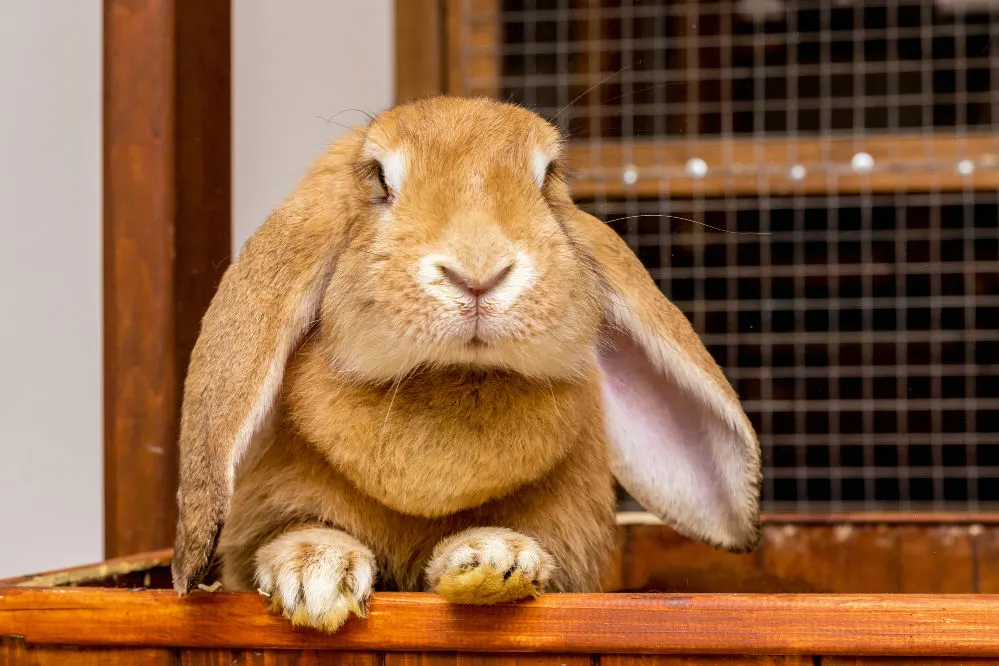
Well, that answer isn’t as clear-cut as you’d think. This guide will break down what you need to know about cat litter for your rabbits, so you can ensure your fuzzy companion has everything they could need.
Is cat litter safe for rabbits?
While it may seem convenient to use cat litter for your pet house rabbit, especially if you have some lying around, there are better choices than this. Rabbits are more likely to eat some of their litter than your cat would, especially if it contaminates their hay or pellets.
Most cat litter contains minerals like clay that may be harmful to your little furballs.
Eating things like clay, clumping, or crystal litters, can cause digestive and other health issues for rabbits, so you should avoid them. Besides, cats and rabbits are not alike, so it makes sense that they can’t necessarily have the same things.
What kind of cat litter can you use for rabbits?
The real answer is that most cat litter types should be avoided when looking for rabbit litter; very few can do the job safely. These include litters that are paper-based and fragrance-free or made from certain types of wood products.
So, yes, you can find cat litter options for your little furball, but it’s tricky.
In contrast, others might be inclined to use litter specifically formulated with rabbits in mind. It is always best to consult your vet or specialist to choose between the different types of litter and find the best products to keep your pet rabbit safe.
In the end, it is always better to find litters that are made with your companion in mind.
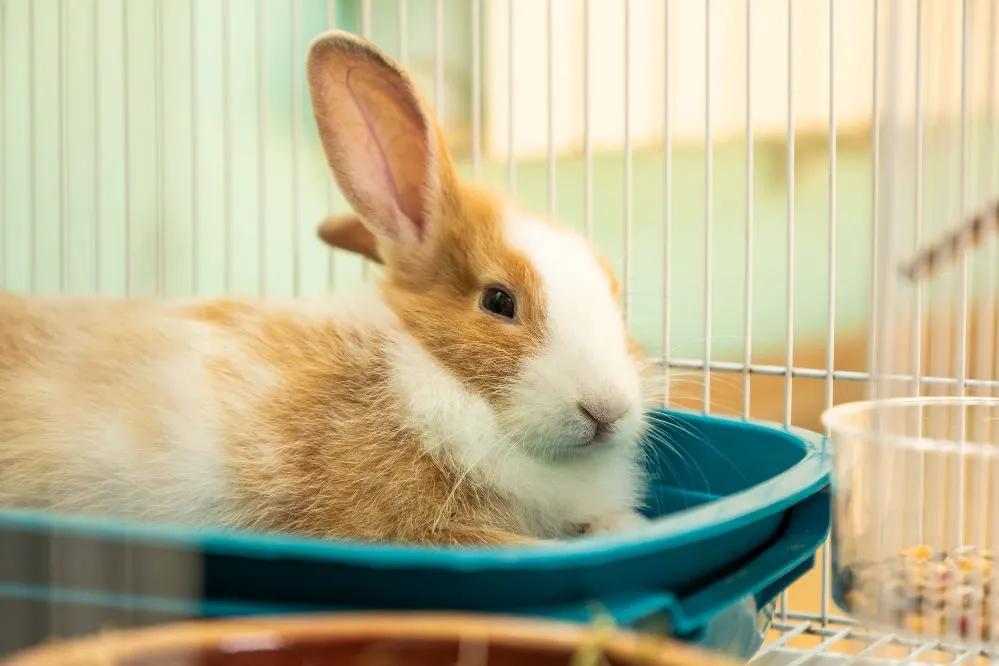
Why shouldn’t I use cat litter for my rabbit?
You’re likely wondering which specific kinds of cat litter you should avoid when shopping for your rabbit friend. Here are some reasons why you should steer clear of specific cat litter for your rabbit.
Can you use clumping and clay litter for rabbits?
The first type of litter that you should avoid is clay-based litter. You’ll find that most cat litter is clay-based because it is designed to clump together once the urine comes in contact with it. This makes it a lot easier to clean out after your cat.
But why is this bad for your rabbit, you may ask? Well, rabbits and cats have different bathroom habits, so to speak. Rabbits often nibble on or eat their litter, making clumping, clay-based litter dangerous for them.
This is because clay litter can be toxic to rabbits, both when ingested and when the dust particles are inhaled. If your bunny eats the litter, it can expand in its tummies and cause blockages.
So overall, it is best to bypass these litter types to prevent your loveable furball from any discomfort or health issues.
Can you use crystal litter for rabbits?
Another litter that is best avoided is crystal litter. This type contains all sorts of chemicals to maintain the crystalized form — and you wouldn’t want your pet rabbit to ingest chemicals now, would you?
Can you use wood-based cat litter for rabbits?
What about wood-based litter? You might think these are natural and perfectly safe for your rabbit, but that isn’t always true. Often, certain toxic chemicals or phenols in wood can be harmful and toxic to rabbits.
In particular, cedar shavings and pine wood contain these chemicals. You might have heard of many rabbit owners using wood shavings or wood pellets as litter and bedding for their rabbits at one stage. While this used to be common practice, recently, these shavings were found to do more harm than good.
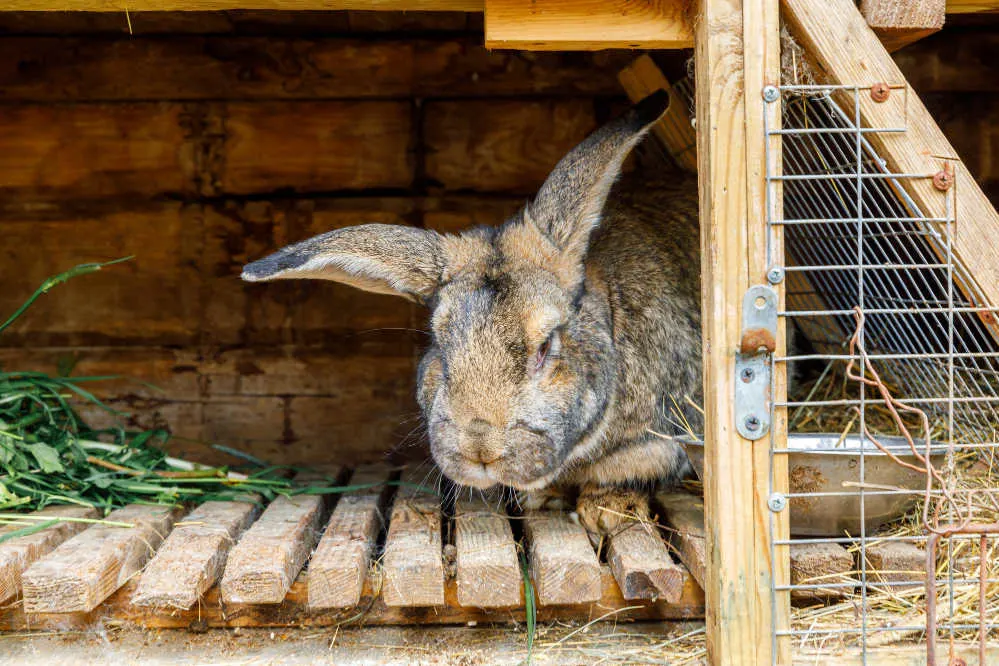
The phenols and harmful chemicals in these types of wood often cause severe liver damage and problems for rabbits. So, you should reconsider using wood or cedar-based litter for your rabbit.
Is scented litter bad for rabbits?
Another type of litter best avoided is scented litter. While this may seem like a pleasant alternative for you, they can adversely affect your little rabbit.
Scented litter can harm your rabbit’s respiratory system, causing irritation to the nose and lungs. Not to mention that this litter can build up in your companion’s digestive system and cause further blockages if eaten.
Bunny health side effects of using cat litter
Now that you know cat litter is best avoided, you might wonder what would happen if you used them anyway. What are the adverse side effects of using cat litter for your rabbit? Here are some of the health effects these litters may have on your furry companion.
Intestinal blockages and digestive problems
Rabbits, as mentioned previously, are more likely to eat their litter. This is a typical and natural behavior for most bunny breeds out there. This is why using the wrong type of litter for your rabbit can be dangerous.
The types of litter mentioned prior are all likely to have adverse effects when ingested, as they weren’t developed with ingestion in mind.
This usually results in blockages within your rabbit’s digestive system, causing anything from mild discomfort to severe damage and life-threatening circumstances. Not to mention any toxic substances that may make your bunny sick.
Respiratory problems
Rabbits are also known to have a sensitive respiratory system and are more prone to issues in this regard. Most cat litter contains clay dust, crystals, or scented particles that are likely to be inhaled by your pet rabbit. This ultimately causes irritation and respiratory diseases in rabbits.
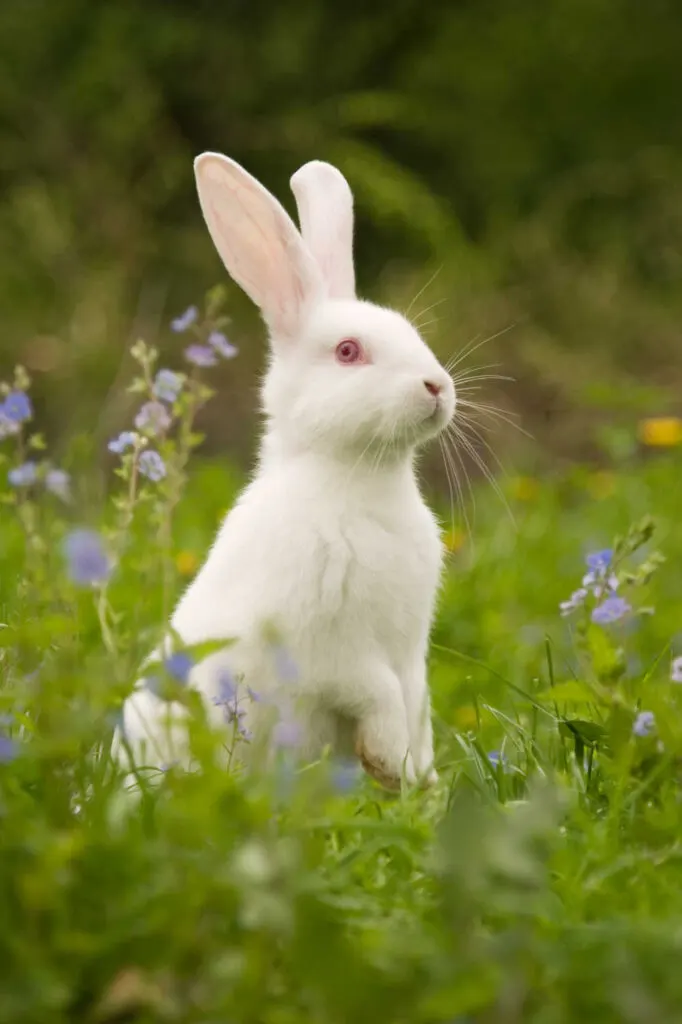
Is there a best litter for rabbits?
Now, you must think that your options regarding the litter to use for your pet rabbit are limited. Worry not! There are many options for litter boxes that are perfectly safe for your little friend.
The best rabbit litter has to be marketed explicitly toward rabbits. More often than not, these rabbit-safe litters are developed to keep their needs, behaviors, and habits in mind. A rabbit-safe litter usually has three characteristics.
First, they are non-toxic and can safely be ingested to account for your rabbit’s natural behaviors.
Secondly, rabbit-safe litter is free of chemicals. Again, this accounts for the fact that your rabbit will likely eat and nibble on their litter, so it is best to keep it chemical free.
Lastly, litter for rabbits should be highly absorbent and odor-repelling. With highly absorbent litter, you’ll be able to avoid a smelly litter box. This is mainly to help with rabbit behavior and keep the rest of your home smelling clean.
Rabbits usually avoid unpleasant odors, so they are likely to do their business elsewhere if your rabbit’s litter box smells, and you wouldn’t want to undo all your hard work from litter-box training.
Rabbit litter types
There are several rabbit-safe litter options for you to get for your fuzzy friend. These are primarily directed towards rabbits and are not toxic, allowing your pet to remain safe and cared for and can be used in the bottom of the litter box or in the corner of your rabbit’s cage. Here are some of these options.
Paper-based litter
Paper-based litter is one of the more popular types for rabbits, specifically paper pellets. They are naturally free of chemicals, non-toxic, and have the added bonus of being biodegradable. Paper-based pellet litter is also highly absorbent, ticking all three boxes for a rabbit-safe litter.
Natural wood-based litter
Another common rabbit litter material is made of natural wood fibers. These fibers are highly absorbent, biodegradable, and mostly safe to ingest. If you insist on using a wood-based litter, consider using one made from aspen shavings.
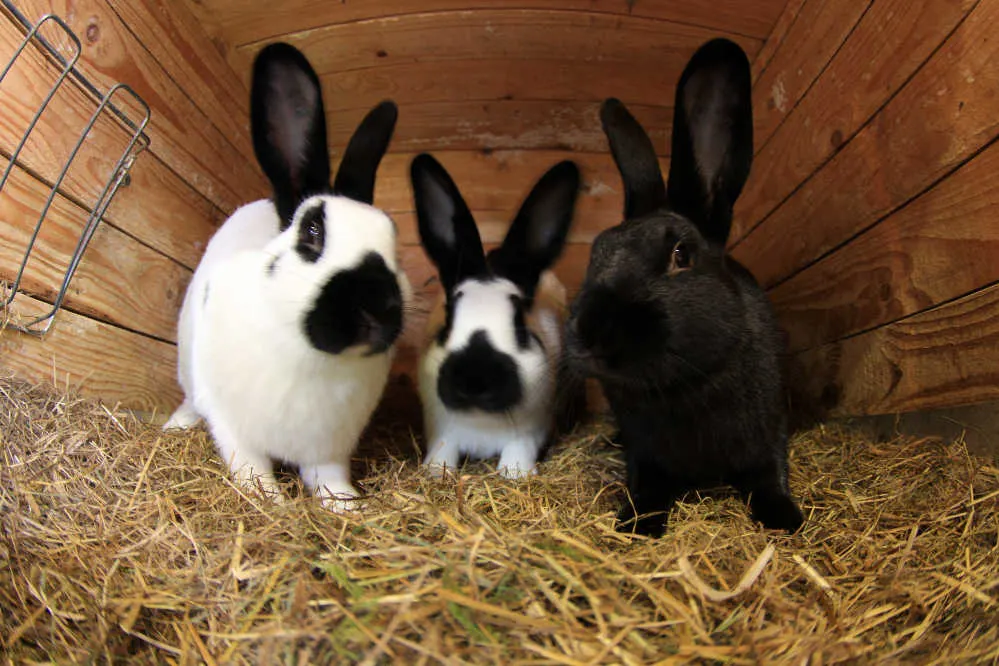
Aspen shavings do a decent job at odor control. However, the pungent smell might be a deterrent for some rabbits. In some instances, aspen shavings could be hazardous if they are eaten and caught in your rabbit’s throat or tummy.
An alternative wood-based option could be sawdust litter. This is compressed into pellets as well and are highly absorbent. These also do a good job at odor control, are affordable, and can be a great option for buying in bulk.
However, given the bad rep of certain wood litter, many rabbit owners choose to use something other than wood-based litter. If you are worried at all, then consult your vet or rabbit breeder, or select an alternative litter variant.
Rabbit-safe litter alternatives
Sometimes, you won’t even need materials marketed specifically as litter. There are a few alternatives out there that work well as bedding and litter options for your rabbit. These are often natural and benefit your rabbit friend in more ways than one.
Hay and straw
Not only is fresh Timothy hay some of the best bedding for guinea pigs, but it is also beneficial for your hopping rabbit friend.
While hay is often used for feeding your rabbit, it can also be helpful for bedding and litter. Rabbits are intelligent — they know where they’ve done their business, so there is no worry about them eating dirty hay. Just make sure that you keep their cage clean and replace hay when necessary.
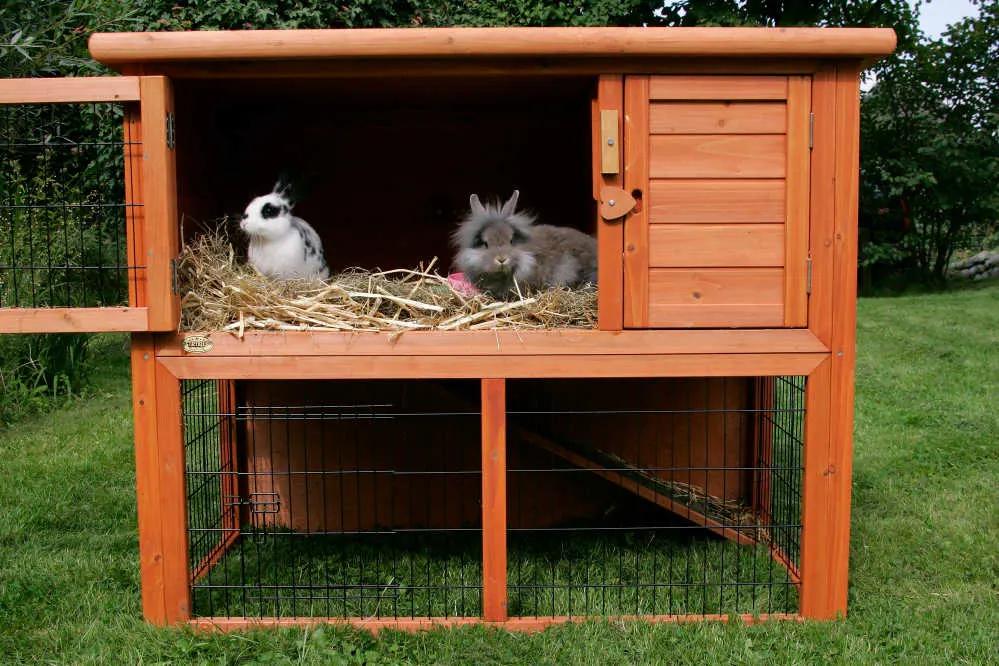
Similarly, straw is an excellent material as your rabbit can safely eat and use it as a potty. As a bonus, straw is compostable, so you can add it to your garden after cleaning out the litter box or cage.
Corn and wheat-based pellets
Consider using corn and wheat-based pellets as rabbit litter for an affordable and eco-friendly option. With these, you won’t have to worry about any dust getting into your bunny’s lungs or be concerned about digestive issues as these are easily digestible.
Can you use cat litter for rabbits | wrapped up
So, there you have it — all you need to know about whether you can use cat litter for rabbits or not. Ultimately, the best thing for you and your furball is to steer clear of cat litter. That makes sense, as these litters aren’t made with rabbits in mind.
As a rabbit owner, your bunny is undoubtedly a loveable member of your family, and you want to ensure they receive the best possible care. So, stick to safe rabbit litter options and natural alternatives that are non-toxic, scent-free, and highly absorbent.
Whether you have a flemish giant or a mini rex, this guide has hopefully cleared up any confusion around the right litter for your pet. As long as you do your research and consult a vet when needed, you’re golden (and your fur baby will thank you later).
Steph Dyson is a travel journalist by trade but a lover of all small pets. She’s been a pet mum to everything from gerbils to guinea pigs, rabbits to hamsters, and fish to dogs of all shapes and sizes. She wants to share her years of experience with small pets and make Small Pet Guides the go-to website for pet owners seeking information and care advice.

